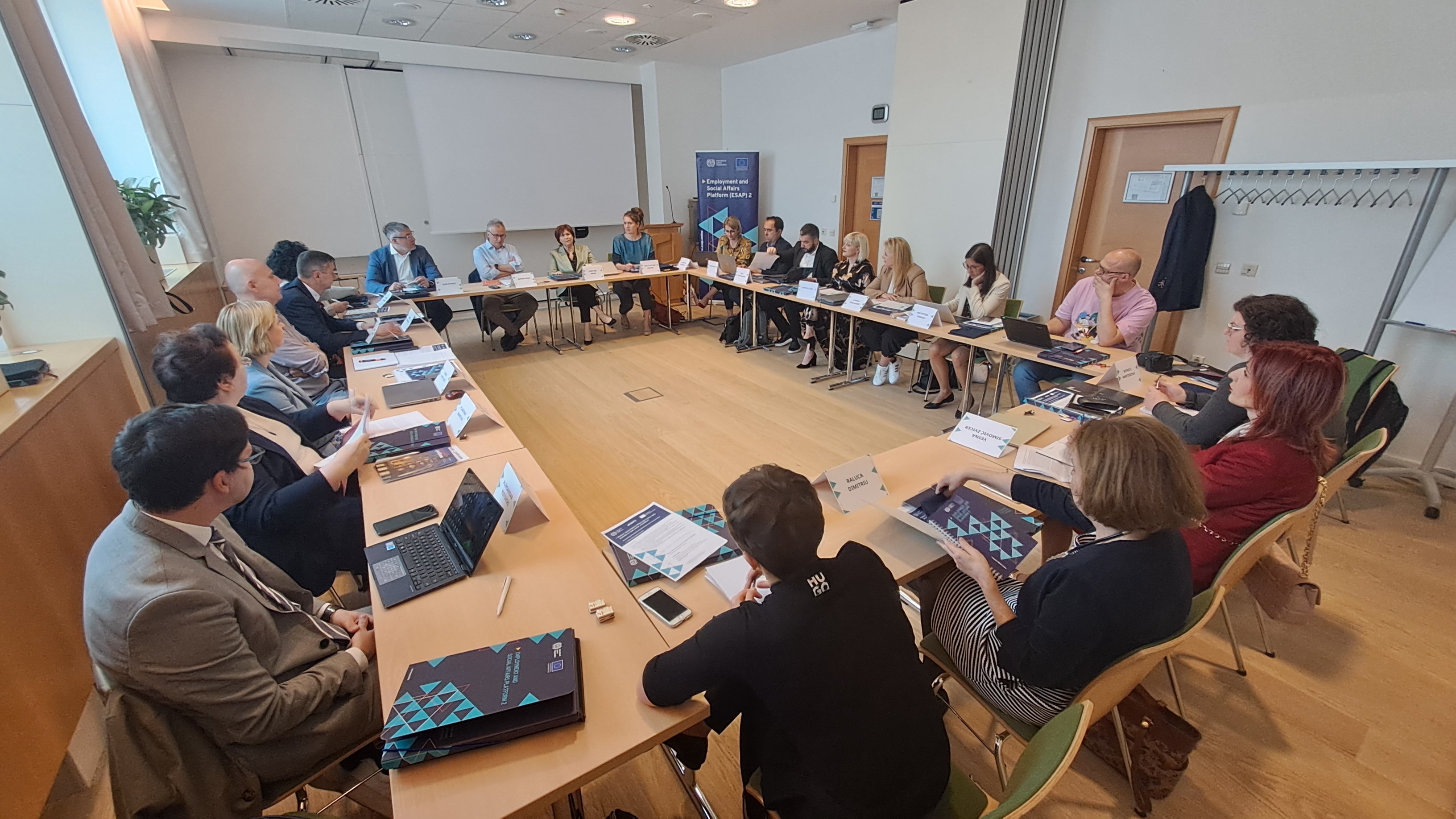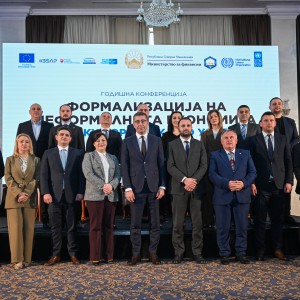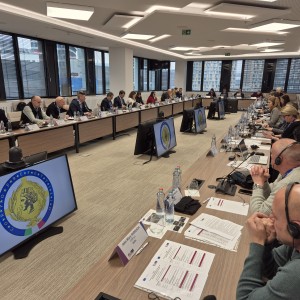News
29 May 2023 |News
ILO ESAP 2: CEELex members meet to discuss the role of workers' representatives

ILO ESAP 2: CEELex members meet to discuss the role of workers' representatives
Members of the Network of Central and Eastern Labour Law Experts, CEELex, gathered for their regular annual meeting in Ljubljana, Slovenia, on May 9 and 10, 2023.
The meeting was attended by 14 CEELex members from the Western Balkans and European Union (EU) participating in Employment and Social Affairs Platform (ESAP) 2 project. ESAP 2 project is funded by the EU and implemented by the International Labour Organization (ILO).
The main focus of the meeting was the role of workers' representatives and their effects on the quality of industrial relations. Participants used this opportunity to present their individual, county based research on this topic and share findings as follows:
Bosnia and Herzegovina
The relationship between trade unions and works councils is not competitive but coordinative, always keeping in mind the basic premise that the goal of both is to protect the socio-economic interests of workers and their rights in relation to work. To protect the right to participation by labour legislation in Bosnia and Herzegovina, the possibility was left for the trade union to propose the establishment of a works council or to assume the competencies of the council when it is not formed. In that sense, based on the analysis, the trade union represents an alternative to the competencies of the works council in exercising the rights of workers' participation in decision-making. For those employers where the trade union is not established, or where the trade union branch does not operate, the works council should be given competencies by the trade union, primarily through the possibility of the works council being a party to collective bargaining and the possibility of the works council organizing and leading a strike. In this way, the gap in protecting the economic and social interests of workers would be filled for those employers where, for any reason, the right to trade union organization could not be realized. These competencies of the works council would be exercised exclusively at the level of the individual employer and would aim to protect the economic and social interests of all workers of that employer.
Bulgaria
There is no universal structure of workers’ representation in Bulgaria, usually a union is the key body, even though the law provides for the election of other representatives for information and consultation. The employees can entrust such rights to the existing trade unions or workers’ representatives. In many public and private companies, the unions are the only representative body of employees. Since 2001 there is a possibility of election of workers’ representatives who will represent their social and economic interests towards the employer. Workers’ representatives can be elected even when there is a union at the workplace. In general, this right is not applied in practice, except from in some large organizations where there are no unions. Collective bargaining is a trade union right. Elected representatives have no role in it. Trade unions still play the main role in employee representation. As a whole, the two forms of workers’ representation interact with each other and aim at putting joint efforts into protecting and supporting the interests of employees.
Greece
Under the L.1767/1988, employees of an enterprise employing at least 50 people have the right to elect and form a work council for their representation in the company. If there is no trade union in the company, it is sufficient to employ 20 workers. The Works Councils decide jointly with the employer on the issues (article 8 par. 3 of Law 2224/1994) such as the preparation of the internal regulations of the enterprise, the health and safety regulations of the company, the preparation of information programs on new methods of business organization and the use of new technologies, the planning of the training of continuous education and the retraining of staff, especially after each conversion of technology etc. The above powers shall be exercised by the Works Council, if there is no trade union in the company, and these issues are not regulated by a Collective Labour Agreement. The Councils consult with the employer if there is no trade union in the company, regarding the collective dismissals and the cases that in general are including at the law on consulting. The Works Council cannot declare a Strike or negotiate collective agreements.
Hungary
In Hungary, in general there is still a wide leeway for further clarification and development of the role of works councils and information and consultation (I&C) mechanisms. Most of all, a clear vision is needed about the expected role and future of this legal institution. Furthermore, the clarity, the depth and the enforcement of works councils’ functions could and should all be improved in Hungary. Owing to several peculiar characteristics of the region - a cautious, tentative reinforcement of the role of elected representatives might be sensible in this context. Also, it seems that recent EU laws and EU policies, by hook or by crook, increasingly attempt to “mainstream” and boost a culture of I & C (even well beyond the classic, “hardcore” labour law terrains of I & C). Among other things, the “upcoming” regulatory arenas of whistleblowing, corporate sustainability reporting (CSRD), platform-work, corporate sustainability due diligence and AI are some of these developments.
Lithuania
From 2017 the two channel workers' representation model exists in Lithuania: trade unions exclusively responsible for collective bargaining and works councils responsible for I & C. Works councils must be mandatory elected for employers with 20 or more employees on average. There is an imperative provision that the competence of works councils is limited only to their right to participate in information and consultation procedures at the employer level. Additionally, the law ensures direct involvement of the State Labour Inspectorate in the process of forming of works councils, i.e. the chairperson of the works council must inform the State Labour Inspectorate in writing about the formation of the works council, its management bodies, and the name of the enterprise where the works council has been formed. Finally, there is a special guarantee systems for workers’ representatives not allowing the employer to (i) dismiss employee representatives on the initiative or at the will of the employer; (ii) worsen, on its own initiative, the indispensable employment contract terms compared to the employment terms of the employees of the same category during the term of office and 6 months after the end of the term of office.
Montenegro
The Labour Law stipulates monistic representation of employees - only through the employees' trade union, or in cases when the trade union is not organized, it has the obligation to inform shop stewards. It also stipulates the obligations of the employer related to informing (which is done ate least once a year), notifying (which is done as needed) and consulting (which is particularly important in the consultation process regarding the collective dismissal) (with whom). Union representatives have an important role in the collective bargaining process. According to the Labour Law, collective agreements can be concluded at three levels, as follows: general collective agreement (only one, at the national level); sector-specific collective agreement (at the level of a sector, group and subgroup of business activity) and collective agreement with employer (at the level of organisation). Collective agreements concluded at a specific level apply to all workers at that level of organising, regardless of whether they are members of representative organisations that have entered into such agreements.
Moldova
In the Republic of Moldova, according to Labour Code, the employees’ collective rights (such as the right to entity administration, the right to collective bargaining etc.) can be defended by their elected representatives at an enterprise level where trade unions have not been established. Legislation does permit the existence of the elected representatives of the employees at a national, branch and territorial level. Moldova's legal system enshrines the monopoly of primary trade union organizations in collective bargaining and conclusion of collective agreements, as well as in the initiation and resolution of collective labour disputes. Regarding the participation in social dialogue commissions, collective bargaining, strikes, in enterprises where there is a trade union organization, but some of the employees are not union members, they have the right to empower the trade union body to represent their interests at bargaining. So, union organization and elected representatives of employees who are not members of the union cannot coexist in a unit.
North Macedonia
The issue of institutionalizing other channels of collective representation of workers besides trade unions, and other types of workers' representatives apart from trade union representatives, had taken practical significance since the moment the Macedonian labour legislation introduced the mechanism of information and consultation in 2010 by making an “attempt” to harmonize with EU Directives.
Takeaways from that process are:
1. The harmonization of the LLR with the Directives (particularly with the I & C Directive) is selective and partial, and includes a literal (to a greater or lesser extent) translation of the Directives’ provisions, which doesn’t have any substantial meaning, neither in terms of the or the content for which information and consultation is conducted, nor in terms of the “channel”;
2. In North Macedonia, there is no substantial definition of the term employees' representatives for information and consultation or similar collegial mechanisms for workers' representation (e.g, works councils); no provisions for the procedure for their election and for delineating their competences from the competences of trade unions;
3) The Law, formally mentions “trade unions”, i.e. trade union representatives for the purpose of information and consultation in the events of: transfer of undertakings, certain issues related to the introduction of night work and grievance procedures.
4) In this kind of legal environment and situation, with underdeveloped system of workers’ participation and vague definition of the term employees’ representatives for the purpose of information and consultation, trade unions/trade union representatives regard other kinds of workers’ representatives as adversaries and “dub” them a Troyan Horse within the Macedonian system of industrial relations.
5) In addition to their role in certain aspects of participation in decision-making with the employer, trade unions, i.e. their representatives have the exclusive right to participate in the collective bargaining on the part of the workers.
Romania
In Romania, the institution of workers’ representatives has been consistently included in the various versions of collective labour dispute regulation over the last 30 years. Workers’ representatives have always been able to represent employees in collective bargaining, collective action or information and consultation procedures. Even in establishments where there is no union, employees can be involved in collective labour relations: from negotiating the collective labour agreement to going on strike. To do this, employees must appoint their representatives by democratic vote. The new Law on social dialogue, adopted in 2022, has removed the possibility of trade unions coexisting with workers’ representatives. In addition, even if they have not achieved representativeness, trade unions can participate in collective bargaining. This creates the conditions for a clearer choice of one or other form of representation. In addition, the new law encourages a type of cooperation between workers’ representatives and the sectoral representative trade union federations, allowing the latter to support the work of representatives with their own expertise. But it will be some time before we can identify the practical effects of these recent legislative changes.
Slovenia
The right to participate in business decisions is a constitutional right in Slovenia and is exercised by the elected workers representative body, the works council. It has the right to information, consultation, co-decision and the right to veto, depending on what is at stake. At the company level, trade unions may also be represented, so that both workers representatives may coexist, or only one of them, or none. Due to various factors, the relationship between unions and works councils varies from strong cooperation and commitment to hostility and rivalry. A strong strategy and various measures are needed to improve collaboration and thus strengthen workers’ voice.
Slovakia
Since their introduction in 2002, works councils were regarded as an alternative but also a competition to trade unions in Slovakia. The competencies and division of rights have changed several times, mostly based on political reasoning, in order to undermine the trade union powers. In practice, the legislative changes did not change the number of works councils and currently, there are around 400 works councils of which 10% co-exists with trade union organization. There are around 660 trade union organizations in the country.
As the second phase of the ESAP 2 comes to an end in December 2023, ILO representatives expressed willingness during the meeting to continue supporting CEELex in the third phase of the project.
Full agenda of the meeting can be found here.





